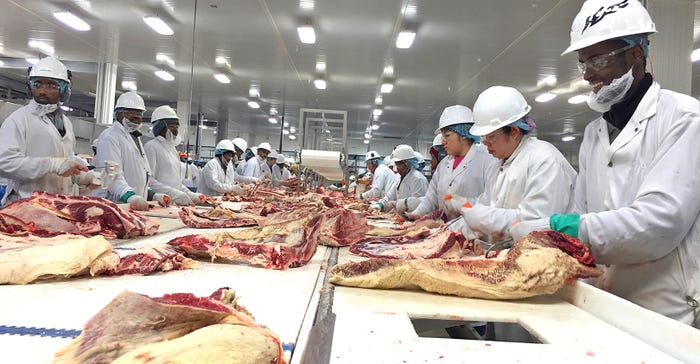April 4, 2019

BREAK DOWN: Workers at the DemKota Ranch Beef plant in Aberdeen, S.D., harvest 1,000 to 1,200 head per day. DemKota Ranch Beef
By Connie Sieh Groop
Thirteen years ago, cattle producers in the Dakotas pinned hopes for added-value for their animals on the construction of a 420,000-square-foot beef-packing facility in northern South Dakota. Today, 1,200 animals are being processed at the Aberdeen, S.D., plant five days a week.
Under new ownership since 2015, the plant at Aberdeen, S.D., processes the animals that the company says exemplify the “DemKota Difference.”
“We define the ‘DemKota Difference’ as the high-quality animals, sourced within 250-miles of the plant,” says Todd Landfried, vice president of branded and export sales and marketing for DemKota Ranch Beef. “Our goal is to buy more animals from a tighter radius, supporting neighbors in this area. It’s all about the family farmers, the multi-generational operations who care for the animals and provide the high-quality feed to the animals by feeding dried distiller’s grain, corn, wheat and cornstalks for roughage.”
In the region, 820,000 head of cattle are on feed at all times. These cattle, along with some from North Dakota, come from some of the best cow-calf operations which have high-quality cattle, bred from British breeds and raised the same way across the area.
DemKota highlights the care that goes into disassembly, the good workmanship and the concern for food safety. Tests show some of the lowest bacteria levels registered by USDA, according to Landfried. The plant was designed by Temple Grandin, a nationally known designer of livestock handling facilities and a professor of Animal Science at Colorado State University. It features a processing line set up on the exterior of the building to fight the transfer of any fecal material when removing the hide. The facility is one of the few with an indoor holding area with temperature-controlled floors.
“From a sales standpoint, we compete at a level for the fine-dining, upper echelon of customers who appreciate the quality of cattle raised in the heartland where cattle and corn meet,” Landfried says. “We are targeting the higher-level customer, who is looking to serve the best beef in the industry. It takes time to get the brand out there.”
DemKota offers DemKota Elite, which features Black Angus; DemKota Gold, which is the non-black British and Continental breeds; and DemKota Legacy, which is a more mature animal, a heiferette or a mother cow that has had four or five calves. These products are all available through the distribution outlets. Products ship to national and international markets. It’s also sold in Aberdeen at Ken’s SuperFair Foods, and it finds its way onto plates at local restaurants such as Jerseys Sports Bar and Grill and the Moccasin Creek Country Club.
“We partner with a couple of different distributors, Quality Foods out of Fargo and Cashwa Distributing of Aberdeen,” Landfried says. “Because of the network, many independent retailers such as Swanson Food Service of Minneapolis, Mason Brothers and Super Valu buy and distribute the product. Through these outlets, a great deal of our beef shows up in the meat cases in retail grocery stores.”
The tri-state area, Florida and California provide the highest volume for the branded market at the present time. “We are slowly gaining traction in the Northeast and in Colorado with interest expanding for Midwest markets,” Landfried says.
More profit for cattle producers
The pant has “definitely been positive for those in the cattle business,” according to beef producer Eric Sumption of Frederick, S.D. He feed cattle about 30 miles from the plant.
“At present, it costs me around $350 to haul a pot load (43-44 head) of cattle to Aberdeen. If I were to get the same bid from Nebraska, it would cost me $1,800 or $2,000 to haul them to Skyler or Grand Island. When you figure the difference, you can see that gives me around an extra $35 a head. That can be the difference between breakeven and making a profit. Multiply that times the loads you haul to see the benefit.”
Each operation depends on the distance from the processing facilities. Depending on trucking costs it can be more. “At one time, it cost me between $2,300 and $2,500 to haul my cattle south. That penciled out to a difference of $55 to $60 per animal.”
“One thing for sure, DemKota has improved the cull-cow market,” Sumption says. “The plant processes cows two or three days a week, and the animals that come from this area are of great quality.”
Sieh Groop writes from Frederick, S.D.
You May Also Like




